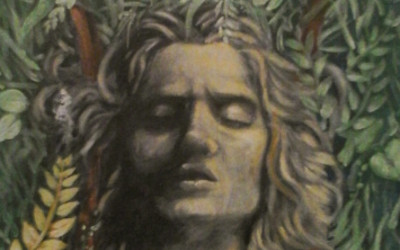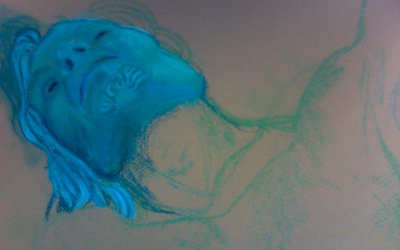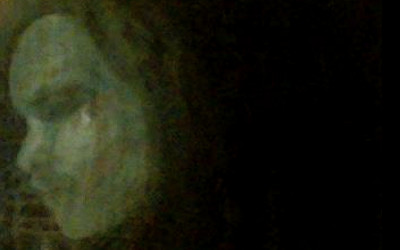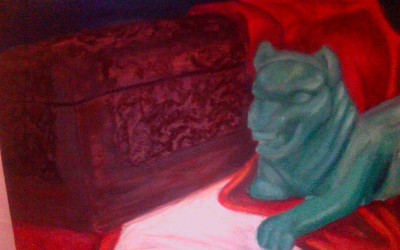ELUTHERIA
A ritual process of elusive ideas
Elutheria is a continuous drama of philosophy, first written as a small complete book in August of 2004. It was written while climbing mountains with Alicia Amaya- returning from the mountains with a book of philosophy was a powerful experience.
I haven’t opened it in 13 years. Opening it now, I just begin to type a passage out. Its clear that its time to copy it out and re create it.
The original Elutheria book is about 100 pages, and takes our friend the philosopher Joseph as a mythical protagonist of the play. He’s prepared to graduate with a philosophy degree, and is looking into graduate school, but is unsure if he really seeks academia, or a monastery. His work is grounded in neo platonism and the German Idealists, and he seems to yearn for a life of free reflection and writing.
During the summer he’s hired to work on an anthropological study of intellectuals in current society, and he selects to visit and write about a quasi religious community of idealist philosophers who live, in all weather conditions, near the summit of a mountain, under a philosophical version of the Benedictine Rule. They wonder the woods in ritual discussion, and study write and sleep in a hidden library cavern below called the vault of San Marco. The community was founded by Elutheria, and Joseph is first interviewed into the community as a visitor by the foremost Scholar, Eudaimonia, who introduces him to their process of ritual examination of ideas, followed by Sister Agape, who revives classical rhetoric in love for truth, and lady Siena, who advocates for the passions against restriction. They are visited by outside philosophers who bring contemporary issues in philosophy and politics into the strange arcane environment for discussion, specifically trends from analytic philosophy as touch on contemporary idealism and the culture of current issues of social justice.
{Eudaimonia 2004}
Eudaimonia-
As for the experiential end of love of wisdom, we affirm, as a community, the reality of the experience of Forms. But what they are, each scholar must answer for her or his self. One may call it a vital encounter with an essence of the mind, another will call it a self induced illusion. And this is just what must be done. The clear process of individual interpretation.
Joseph- But given the ‘mythic platonism’, I imagine its suited to certain people, to certain temperaments. I mean, if atheists are part of it they must at least be sympathetic to spiritual imagery?
E- I suppose thats true. Aesthetically, but not metaphysically, they resonate with a myth. all Monks choose orders for reasons.
J- And all monks are acetic. May I ask, how does this work with your Order?
I mean, the renunciation of flesh?
E- If one has such a dualistic mindset, such an inclination then yes. But cynics , Epicureans, Cynranaics could be here. Practical philosophies of various kinds, aesthetics yes, but all must account for how they choose. Certainly, temperamentally, all this brings us to the heart of the rule, that is, to the ritual dialectic.
J- If I may, I’m assuming you mean dialectic in the socratic sense rather then the german 19th c sense? Given that your rooted in Athens.
But latter, I’ll ask you how you relate to neo kantians, phenomenologists…I don’t mean to digress.
Eu- Yes, very much the socratic sense. Your question is good. If we’re a community rooted in athens, intellectually, we meet the thinkers of the ages. The Idealist Germans are absolutely met with Nietzsche and analytic and continental thought are not ignored but faced so far as we have knowledge. But where so many excel in training, but never self reflection, we excel in self reflection, but are often weak in training. The balance is desired. You alluded to formal schooling?
J- Yes, an undergraduate degree in philosophy, Im looking for a Doctorate program.
E-Perhaps you will help us? But back to the rule-
J- please!
E- As you say, the inspiration for our method is socratic. Early on, Elutheria walked with her scholars in the woods, and they reserved a ritual space in these conversations, a time of purposeful focus on the matter of our work, that is, those elusive questions of our worlds which are not easily answered, the answers which, by their very nature, defy measurability concerning truth. These questions and the answers proposed are called Elusive Matter’ and comprise the heart of our labor. A formal logic tires to subdue them, treating them as if a science of ideas were possible,but this in the end is a surface game, providing insight, but full of hubris.
What Elutheria spoke was a conscious belief, above all, an inquiry into the origins of belief, an insight into the nature of belief about Elusive Matter. She called for Scholars to be active, to make their proposals, to build their systems, for systems, she said, are temporal structures of provisional thought, but the insights they yield are at their best, profound, could never be reached without such structures.
But to these builders, she asks, why do you believe what you believe? Make transparent the process of your thought, logically, emotionally, in every way, make bare your predilections. Examine you temperament and your leanings, separate your Reason from your wish for certainty, and admit how human your reason is. By such examination, we show how frail we are as thinkers, and far from the invalidation of structured thought, it advances it. Dealign with Elusive Matter is the bravest thing we know to do, and the answers we have in the end are spectral, calling for manifestation on this earth. But in these specters are solidities, elements which are closer to certainties, and by this process we hope to find the, and build with them from the closest image of the world as it is.
So first what Scholars would do as they walked, would gather the Elusive Matter, a gathering of questions. What is the aim of philosophy? What is the nature of a lie? Can two contrary things be true? after they speak of what they read or what they thought of what they read, and would try again to reason through it. They developed a sacred process of questions, to find what they themselves believed. always from a spirit of mutual learning, never from attack or defense.
Question: What do you think of the soul?
Answer: That depends, what do you mean by the Soul?
Answer: By soul I mean to describe…….
By this ritual way they moved to definitions, and a more and more detailed look into what they thought. It led to provisional proposals. The other would respond if they agreed or disagreed, and why, leading to more detailed looks and definitions.
Elutheria’s call to self examination of belief was a call to honesty, a commitment to find reality in the Elusive Matter. A renunciation of pride or the appearance cognitive athletics, or rhetorical avoidance, the surface appearance of wisdom or cleverness. She would say, “I value humility in structured thinkers more the I value answers. Why is this? Because I value answers that are real.”
She would say, “thinking, carefully and clarified in the Elusive Matter, is yearning for Reality. If it falls short, it is a wooing of Reality. and is noble in itself.
As I’ve said, she disliked the intellectual passivity which believe without knowing why, and equally hated the passivity of thinkers who fain themselves too deep to try for answers.
“To be a philosopher” she said “you can’t be a politician of the academy. In being a philosopher, you must love wisdom for its own sake. Out of a love of wisdom, you must know what you mean by love, and what you mean by wisdom, and out of these meanings build toward what you think is certain. Not only the certainties of simplicities, but toward the certainties of complexities. In this you will risk folly, but it is the folly of a wise love you risk.”
She developed for the scholars a more detailed process of ritual discourse. It could always be simplified or expand or corrected, or abandoned completely. But it served them well and remains to the present the most common form of ritual discourse.
The scholars, wishing to labor in the elusive matter, will gather the questions.
First, they will ask,
“What is the question?”
The thinker will specify the Elusive question.
“What is the answer?”
The scholar will speak her answer. In both question and answer, definitions are clarified by the ceremony I described before.
Then, they will ask
‘What is its origin?”
This is a difficult question. If the thinker engages in a convincing story of how she came to the answer, tainted with persuasion, philosophy has died in it, and cleverness has taken up its image.
But if she speaks from a longing fro reality, she will move forward with the process. The reasons for believing as you know are many, we try to list them, though we’re sure its incomplete and over lap at times. Here are some reason we look at.
First of corse, is intellectual passivity. “I believe, because everyone does”. This is much less mindful then appeal to authority. It also can be stated, “I believe its true, who cares why.”
The second is personal need to believe. “I just have to believe there is a God, or else it just seems senseless.”
The third is appeal to authority. “Ficino says that this is so. The whole of his writings point to his prominence as a scholar, he is a fit judge of the question.”
Fourth is an intuitive ‘resonance’ with something that is hear or read.. “I feel in my heart that this is right.”
Fifth is revelation. “I read in the word of God that that this is true.”
Sixth is personal experience. “I saw this for my self, i know its true.”
Seventh is intuitive speculation. “I have an insight into this matter”.
Eighth is scientific. “I can prove this is true by implications of the natural sciences.”
Ninth is interpretive. Its arrived at by the whole of the ritual process and the list of reasons to believe. Also the question of origin is tracing of personal history of belief, of influences, and traits of character that move one in directions of belief.
Next, the scholar is asked,
how do you sustain it?
This is the attempt to explain the answer as objectively as possible, by formal logic, by dynamic reason, shown reason to belief it independently of the believer.
How do you challenge it?
Provisional counterpoint
Now in powerful honesty the Scholar must challenge her own belief. She must find the best and brightest reasons against her inclinations, against her own position, and select from among them the most convincing one.
If her original answer survives the last, she accounts for how and why. It becomes a provisional proposition.
The other scholars now discuss it, and work with it, adding their own challenges or reason to sustain it. As they account to themselves if they agree or disagree, it is called “provisional Counterpoint’. Much of the scholars work consists of such counterpoint. And the process begins again, now for themselves, ether as counterpoint or as the oping of new questions.
J- if I may ask….when a scholar sustains her answer after the question, ‘how do you challenge it?” (If I have this right ?) whats the criteria sustaining it? Some sort of logical proof?
E- the scholar must account for it though it may or may not be convincing to others, and if others are unconvinced , and often are, out opens the world of counterpoint. We’ve entered a highly subjective arena of thinking where, if someone disagree with the scholars proposal, they can appreciate its eloquence or its power, and admire the honesty and precision of their thought, or of course the reverse, feel to themselves that the process was compromised or devolved into rhetoric. The final criterion is their conclusions may or may not hold well with the formal logic, but the very stuff of the Elusive matter is not so neatly fit into logic. Logicians themselves come out with very different answers. The Elusive Matter can elude us.
J-I’ve often wondered about that. A philosophy, like Schelling’s Ideas concerning a Philosophy of Nature is inspiring to me. it speaks to me, but a proof that Nature is somehow not unlike human genius is hard to come by. if not impossible. I don’t think that makes it a bad philosophy, but not a provable philosophy. It lifts the human sprit to a place of profound idea.
As part of the Rule we call what you speak of as ‘the fourth gradation.” we recognize four gradations of proposal, the closest and furtherest from objective provability, or at least in the Elusive Matter, the closest or furthest from in-disputability.
The First is of course epitomized in mathematics, but in the Elusive Matter we can say ‘In the human experience, after night comes day”. Of course the day could not come, but so far as proposals go, its as close to certainty as we come.
The second has an interpretive element. ‘Death teaches us how to live.”
This can be disputed, but its reasonable enough that an encounter with mortality can make us experience the living moments intensely, and see our lives in new perspective.
The third is still further away, it makes a statement about the nature of the world, which may be disputable, and may bot seem reasonable, but it marshals an intuitive power. For example, ‘the purpose of death is to teach us how to live.”
The fourth is furthest away from the first. It may seem to be so far removed from certainly that it exists almost as a symbolic structure, a philosophical myth that lifts the mind, as you say, to a realm of lofty consciousness . Ideas of the Fourth gradation can grant us an intuitive experience of the world, and lead us to insight we would never have known without it.
The clarity of the First Gradation endangers us with not staying to close to it, to not venturing into philosophy. And each successive gradation has the greater peril of straying from the first.
In the Rule of our order, we affirm the Fourth gradation. We do not demean it. But we must be clear what it is and when it appears. We must not cloth it as the first, we must know it as it is, a rational-mythic painting of the world.”








